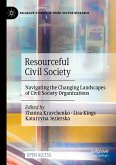Resourceful Civil Society
Navigating the Changing Landscapes of Civil Society Organizations
Herausgegeben:Kravchenko, Zhanna; Kings, Lisa; Jezierska, Katarzyna
Resourceful Civil Society
Navigating the Changing Landscapes of Civil Society Organizations
Herausgegeben:Kravchenko, Zhanna; Kings, Lisa; Jezierska, Katarzyna
- Gebundenes Buch
- Merkliste
- Auf die Merkliste
- Bewerten Bewerten
- Teilen
- Produkt teilen
- Produkterinnerung
- Produkterinnerung
This open access book examines how civil society organizations in Poland, Russia, and Sweden (re)act to transformations of opportunities and limitations in access to various forms of resources. The volume's contributions discuss the constraints associated with different types of resources as well as organizations' capacities to generate resources-or compensate for their lack-as they negotiate and contest barriers. The resourcefulness of civil society is revealed to be rooted in a variety of capabilities: converting resources, eliciting organizational change, and metamorphosing in response to organizational and environmental development.…mehr
Andere Kunden interessierten sich auch für
![Resourceful Civil Society Resourceful Civil Society]() Resourceful Civil Society33,99 €
Resourceful Civil Society33,99 €![Professionalism and Social Change Professionalism and Social Change]() Professionalism and Social Change105,99 €
Professionalism and Social Change105,99 €![Political Professionalization Political Professionalization]() Wijayantha UkwattaPolitical Professionalization49,99 €
Wijayantha UkwattaPolitical Professionalization49,99 €![International Handbook of Migration, Minorities and Education International Handbook of Migration, Minorities and Education]() International Handbook of Migration, Minorities and Education306,99 €
International Handbook of Migration, Minorities and Education306,99 €![Class and Contemporary British Culture Class and Contemporary British Culture]() A. BiressiClass and Contemporary British Culture41,99 €
A. BiressiClass and Contemporary British Culture41,99 €![Image as a profession Image as a profession]() João AreosaImage as a profession58,99 €
João AreosaImage as a profession58,99 €![The Stratifying Trade Union The Stratifying Trade Union]() Shaul A. DukeThe Stratifying Trade Union41,99 €
Shaul A. DukeThe Stratifying Trade Union41,99 €-
-
-
This open access book examines how civil society organizations in Poland, Russia, and Sweden (re)act to transformations of opportunities and limitations in access to various forms of resources. The volume's contributions discuss the constraints associated with different types of resources as well as organizations' capacities to generate resources-or compensate for their lack-as they negotiate and contest barriers. The resourcefulness of civil society is revealed to be rooted in a variety of capabilities: converting resources, eliciting organizational change, and metamorphosing in response to organizational and environmental development.
Produktdetails
- Produktdetails
- Palgrave Studies in Third Sector Research
- Verlag: Palgrave Macmillan / Springer International Publishing / Springer, Berlin / Södertörn University / U
- Artikelnr. des Verlages: 978-3-030-99006-0
- 1st ed. 2022
- Seitenzahl: 388
- Erscheinungstermin: 9. Juni 2022
- Englisch
- Abmessung: 216mm x 153mm x 26mm
- Gewicht: 613g
- ISBN-13: 9783030990060
- ISBN-10: 3030990060
- Artikelnr.: 63448845
- Herstellerkennzeichnung Die Herstellerinformationen sind derzeit nicht verfügbar.
- Palgrave Studies in Third Sector Research
- Verlag: Palgrave Macmillan / Springer International Publishing / Springer, Berlin / Södertörn University / U
- Artikelnr. des Verlages: 978-3-030-99006-0
- 1st ed. 2022
- Seitenzahl: 388
- Erscheinungstermin: 9. Juni 2022
- Englisch
- Abmessung: 216mm x 153mm x 26mm
- Gewicht: 613g
- ISBN-13: 9783030990060
- ISBN-10: 3030990060
- Artikelnr.: 63448845
- Herstellerkennzeichnung Die Herstellerinformationen sind derzeit nicht verfügbar.
Zhanna Kravchenko is Associate Professor of Sociology at Södertörn University, Sweden. She has published on various aspects of societal transformation in Russia. Her current research examines the development of civil society, with a particular focus on the role of transnational funding for civil society organizations working with human rights and democracy. Lisa Kings is Associate Professor of Social Work at Södertörn University, Sweden. She has conducted extensive empirical and theoretical research in the field of civil society, including urban social movements. Her recent work focuses on action research and connecting academic research to civil society practice. Katarzyna Jezierska is Associate Professor of Political Science at University West, Sweden. Her research interests center on the intersections between civil society and formal politics. She has published on radical democratic subjectivity, think tanks' involvement in policymaking, and the engagement of diplomats with civil society actors.
1. Introduction, Zhanna Kravchenko, Lisa Kings and Katarzyna Jezierska.- Part I. Resources as Constraints.- 2. Pecunia olet: The funding dilemma for think tanks in Poland, Katarzyna Jezierska.- 3. Domestic funding for civil society in a non-democratic context: The example of the Presidential Grants in Russia, Yulia Skokova and Christian Fröhlich.- 4.Polish human rights organizations: Resisting institutional pressures, Zhanna Kravchenko, Katarzyna Jezierska, Marta Gumkowska, Beata Charycka, and Magdalena Szafranek.- 5. . Rural community development in Sweden: From challenging to mainstream?, Anette Forsberg.- Part II. External Constraints and Facilitators of Resources- 6. From local to digital and back: E-resourcefulness among urban movements in Poland, Anna Domaradzka.-7. Between autonomy and compliance: The organizational development of Russian civil society, Vsevolod Bederson and Andrei Semenov.- 8. Navigating contemporary developments in Swedish civil society: The case of Save the Children Sweden, Lisa Kings.- 9. Humane resources? The people behind Polish civil society organizations, Galia Chimiak.- Part III. Organizations and Resources: Intertwined Transformations.- 10. Doing the right things or doing things right? Exploring the relationship between professional autonomy and resources in volunteering, Cecilia Gullberg and Noomi Weinryb.- 11. Liberty, loyalty, and solidarity. The role of transnational, national, and local resources in voluntary organizations in Russia, Zhanna Kravchenko.- 12. Resources shifting values: Online and offline resources in Swedish civil society, Håkan Johansson and Gabriella Scaramuzzino.-Chapter.- 13. St. Petersburg LGBTQI+ activists negotiating financial and symbolic resources, Pauliina Lukinmaa.-Chapter 14. Epilogue, Apostolis Papakostas
1. Introduction, Zhanna Kravchenko, Lisa Kings and Katarzyna Jezierska.- Part I. Resources as Constraints.- 2. Pecunia olet: The funding dilemma for think tanks in Poland, Katarzyna Jezierska.- 3. Domestic funding for civil society in a non-democratic context: The example of the Presidential Grants in Russia, Yulia Skokova and Christian Fröhlich.- 4.Polish human rights organizations: Resisting institutional pressures, Zhanna Kravchenko, Katarzyna Jezierska, Marta Gumkowska, Beata Charycka, and Magdalena Szafranek.- 5. . Rural community development in Sweden: From challenging to mainstream?, Anette Forsberg.- Part II. External Constraints and Facilitators of Resources- 6. From local to digital and back: E-resourcefulness among urban movements in Poland, Anna Domaradzka.-7. Between autonomy and compliance: The organizational development of Russian civil society, Vsevolod Bederson and Andrei Semenov.- 8. Navigating contemporary developments in Swedish civil society: The case of Save the Children Sweden, Lisa Kings.- 9. Humane resources? The people behind Polish civil society organizations, Galia Chimiak.- Part III. Organizations and Resources: Intertwined Transformations.- 10. Doing the right things or doing things right? Exploring the relationship between professional autonomy and resources in volunteering, Cecilia Gullberg and Noomi Weinryb.- 11. Liberty, loyalty, and solidarity. The role of transnational, national, and local resources in voluntary organizations in Russia, Zhanna Kravchenko.- 12. Resources shifting values: Online and offline resources in Swedish civil society, Håkan Johansson and Gabriella Scaramuzzino.-Chapter.- 13. St. Petersburg LGBTQI+ activists negotiating financial and symbolic resources, Pauliina Lukinmaa.-Chapter 14. Epilogue, Apostolis Papakostas








